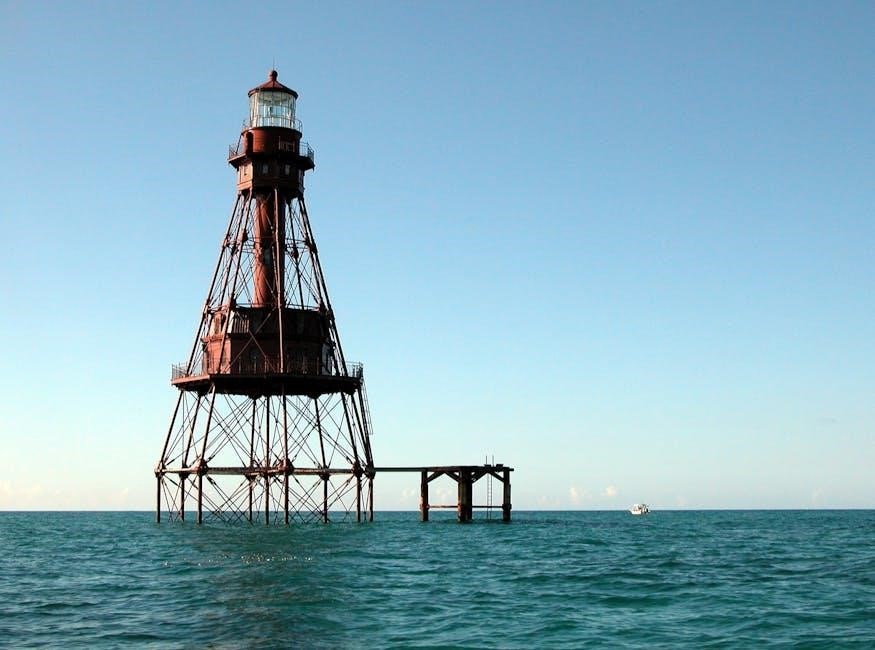
Houston maritime attorneys specialize in handling injuries, boating accidents, and offshore incidents, providing legal expertise tailored to maritime law and compensation claims.
Overview of Maritime Law and the Role of Houston Maritime Attorneys
Maritime law governs legal matters related to navigation, shipping, and offshore activities. Houston maritime attorneys specialize in this complex field, addressing injuries, accidents, and disputes involving seamen, vessel owners, and maritime businesses. Their expertise includes statutes like the Jones Act and the Longshore and Harbor Workers’ Compensation Act, ensuring clients receive fair compensation for injuries or losses. With Houston’s strategic location on the Gulf Coast, these attorneys play a critical role in protecting the rights of maritime workers and businesses, navigating intricate legal frameworks to secure justice and financial recovery for those affected by maritime incidents.
Why Houston is a Key Location for Maritime Legal Services

Houston’s strategic position along the Gulf Coast makes it a hub for maritime activities, with numerous ports and waterways facilitating trade and commerce. The city’s robust maritime industry attracts specialized legal services, catering to seamen, offshore workers, and businesses operating in the sector. Houston’s concentration of experienced maritime attorneys ensures access to legal expertise tailored to the unique challenges of maritime law. The city’s infrastructure and economic significance in the maritime sector further solidify its role as a key location for resolving disputes, handling injuries, and navigating complex legal issues related to Admiralty and maritime commerce.

Key Maritime Laws and Regulations
Maritime laws and regulations govern rights, remedies, and responsibilities, ensuring safety and justice for maritime workers, vessel owners, and businesses operating in the maritime industry.
The Jones Act: Protecting Seamen and Offshore Workers
The Jones Act, also known as the Merchant Marine Act of 1920, is a federal law that protects seamen and offshore workers injured on the job. It allows eligible maritime workers to seek compensation for injuries caused by employer negligence. To qualify under the Jones Act, workers must be employed on a vessel in navigable waters and contribute to the vessel’s mission. Unlike traditional workers’ compensation, the Jones Act requires proof of employer negligence. Houston maritime attorneys specializing in the Jones Act help injured workers navigate complex legal processes, ensuring they receive fair compensation for medical expenses, lost wages, and pain and suffering. Their expertise is crucial for securing justice in these cases.
General Maritime Law: Rights and Remedies for Injured Workers
General maritime law provides a broad framework of rights and remedies for injured workers in maritime-related accidents. Unlike the Jones Act, it applies to a wider range of maritime employees, including harbor workers and those on fixed platforms. Under this law, injured workers can pursue compensation for negligence, unseaworthiness, or failure to provide a safe working environment. Houston maritime attorneys skilled in general maritime law help clients recover damages for medical expenses, lost wages, and pain and suffering. This legal framework emphasizes the duty of care owed to maritime workers, ensuring they receive justice for injuries sustained in their line of duty.
The Longshore and Harbor Workers’ Compensation Act (LHWCA)
The Longshore and Harbor Workers’ Compensation Act (LHWCA) provides compensation for maritime workers injured on the job, excluding seamen and certain offshore workers. This federal law ensures medical benefits, disability payments, and vocational rehabilitation for eligible employees. Covered workers include longshoremen, harbor workers, and those engaged in maritime-related activities. The LHWCA is a no-fault system, meaning injured workers receive benefits regardless of employer negligence. Employers must provide notice and cooperate with claims filed through the Office of Workers’ Compensation Programs (OWCP). Houston maritime attorneys often assist in navigating LHWCA claims, ensuring workers receive fair compensation and addressing disputes when necessary. This act is crucial for protecting maritime workers’ rights in the Gulf Coast region.
Common Maritime Injuries and Accidents
Maritime injuries often result from falls, equipment malfunctions, or offshore accidents, causing physical harm and emotional trauma, necessitating legal advice from experienced Houston maritime attorneys.
Offshore Accidents: Causes and Consequences
Offshore accidents are common in maritime operations, often caused by equipment failure, harsh weather, or human error. These incidents can result in severe injuries, fatalities, or environmental damage. Workers may suffer from physical harm, emotional trauma, and long-term health issues. Consequences include costly legal battles, financial losses, and reputational damage for employers. Houston maritime attorneys play a crucial role in investigating these accidents, determining liability, and securing fair compensation for victims. Their expertise ensures that victims receive the support and justice they deserve, while also addressing the broader implications for maritime safety and industry standards.
Boating and Vessel Accidents: Liability and Compensation
Boating and vessel accidents can result from collisions, equipment failures, or reckless operation, often leading to injuries or fatalities. Liability may fall on vessel owners, operators, or employers, depending on negligence or regulatory violations. Victims may be entitled to compensation for medical expenses, lost wages, and pain and suffering. Houston maritime attorneys specialize in navigating these complex cases, ensuring victims receive fair restitution. They investigate accidents, assess liability, and advocate for maximum compensation, whether through settlements or trials. Legal representation is crucial for understanding rights and securing justice in maritime accidents involving recreational or commercial vessels.
Cargo Accidents and Injuries in Maritime Operations
Cargo accidents are a significant risk in maritime operations, often caused by improper loading, equipment malfunctions, or unsafe practices. These incidents can lead to severe injuries, such as crushed limbs or spinal injuries, among workers. Employers and vessel owners may be held liable if negligence or violations of safety protocols are identified. Houston maritime attorneys assist workers in pursuing compensation for medical costs, lost income, and long-term disabilities. They also help navigate complex legal frameworks to ensure victims receive the benefits they deserve. Proper legal representation is essential to address the unique challenges of cargo-related accidents in maritime settings.
Understanding Compensation and Legal Rights
Understanding compensation and legal rights is crucial for maritime workers, covering medical costs, lost wages, and pain and suffering, while ensuring timely legal action and protection.
What Compensation is Available for Maritime Injuries?
Maritime injuries often entitle victims to compensation covering medical expenses, lost wages, and pain and suffering. Depending on the circumstances, additional benefits like disability support or funeral expenses may apply. Experienced Houston maritime attorneys can help determine the appropriate compensation and ensure fair recovery under maritime laws. Calculating these amounts requires careful analysis of the incident, employment status, and long-term impacts. Consulting with a skilled attorney is crucial to navigate the complexities and secure the maximum entitlements available. Understanding your rights and options is the first step toward obtaining the justice and financial support you deserve.
How to Calculate Maritime Injury Compensation
Calculating maritime injury compensation involves assessing medical expenses, lost wages, and pain and suffering. The extent of disability and long-term impacts on employment are also considered. Under the Jones Act and general maritime law, compensation may include future lost earnings and rehabilitation costs. Experienced Houston maritime attorneys use specialized knowledge to evaluate these factors accurately. They ensure that all applicable benefits are included in the calculation, providing a comprehensive approach tailored to each case. Consulting with a skilled attorney is essential to navigate the complexities and secure a fair settlement that reflects the full extent of the injury’s impact.

The Importance of Legal Representation in Maritime Cases

Legal representation is crucial in maritime cases due to the complexity of maritime law and the need for specialized expertise. An experienced Houston maritime attorney understands the nuances of admiralty and maritime laws, ensuring that your rights are protected and that you receive fair compensation. They will investigate the circumstances of your injury, gather evidence, and negotiate with insurance companies or employers on your behalf. A skilled attorney can also represent you in court if necessary, advocating for your best interests. Without proper legal representation, you risk undervaluing your claim or missing critical deadlines, which could result in reduced or denied compensation. Their expertise ensures that your case is handled effectively and that you achieve the best possible outcome.

How to Choose the Right Houston Maritime Attorney
Selecting a Houston maritime attorney requires evaluating their experience, expertise, and track record in handling maritime cases. Look for lawyers with proven success in admiralty law and a deep understanding of maritime regulations. Ensure they offer free consultations and work on a contingency fee basis. Check their reputation, client reviews, and ability to provide personalized attention. A local attorney familiar with Houston’s maritime landscape can offer tailored guidance and support, ensuring your legal needs are met effectively.
Experience and Expertise in Maritime Law
Experience and expertise are crucial when selecting a Houston maritime attorney. Look for lawyers with a strong background in maritime law, including admiralty and offshore injury cases. Attorneys with years of experience handling complex maritime disputes, such as those involving the Jones Act or general maritime law, are better equipped to navigate these specialized cases. Many Houston maritime attorneys have worked on both plaintiff and defense sides, offering a unique perspective. Their expertise ensures they understand maritime regulations, vessel operations, and the challenges faced by seamen and offshore workers. A track record of success in securing fair compensation for clients underscores their proficiency in this niche legal field.

Reputation and Track Record of Success
A reputable Houston maritime attorney has a proven track record of successfully handling maritime cases, ensuring clients receive fair compensation. Look for attorneys recognized with awards like “Lawyer of the Year” in maritime law, as this reflects their expertise and credibility. A strong track record indicates their ability to navigate complex cases, such as those involving the Jones Act or admiralty law. Successful resolutions of past cases demonstrate their skill in negotiation and litigation. Client testimonials and positive reviews further highlight their reliability and dedication to maritime law. A proven history of success is essential for securing the best possible outcomes in maritime injury claims.
Resources and Support for Maritime Injury Cases
Houston maritime attorneys provide extensive resources and support to ensure clients receive the best possible outcomes. Many firms offer free consultations to discuss case details and legal options. With contingency fee arrangements, clients only pay if they win their case. Experienced maritime attorneys have access to a network of experts, including medical professionals and accident investigators, to strengthen cases. They also provide guidance on navigating complex maritime laws, such as the Jones Act and general maritime law. Additionally, they assist with gathering evidence, interviewing witnesses, and negotiating with insurance companies. Their comprehensive support ensures clients are well-represented and informed throughout the legal process.
Free Consultation and Contingency Fee Options
Many Houston maritime attorneys offer free consultations to discuss your case and provide initial legal guidance. This allows you to understand your options without upfront costs. Additionally, contingency fee arrangements are common, meaning you only pay if your case is successful. This approach ensures that legal representation is accessible to everyone, regardless of financial circumstances. During the free consultation, your attorney will assess the merits of your case, explain the legal process, and outline potential outcomes. This no-risk approach provides peace of mind and ensures that your focus remains on recovery while your attorney handles the legal complexities of your maritime injury claim.
Local Knowledge of Houston Maritime Laws and Regulations
A Houston maritime attorney with local knowledge understands the unique legal landscape of the Gulf Coast, ensuring compliance with both state and federal maritime laws. Their familiarity with Houston’s ports, waterways, and jurisdictional specifics can significantly impact the outcome of your case. Local attorneys often have established relationships with experts, investigators, and officials in the area, which can aid in gathering evidence and building a strong case. This localized expertise allows them to navigate complex legal nuances, ensuring that your rights are protected and that all relevant regulations are appropriately addressed. Their in-depth understanding of Houston’s maritime environment is crucial for effective legal representation.
Red Flags to Avoid When Selecting a Maritime Attorney
When choosing a Houston maritime attorney, beware of red flags such as lack of specific maritime law experience or a history of disciplinary actions. Avoid attorneys who make unrealistic promises or lack transparency about their track record. Be cautious if they fail to communicate clearly about your case or legal options. Additionally, steer clear of lawyers who do not offer a free consultation or seem unwilling to listen to your concerns. Prioritize attorneys with proven expertise, a strong reputation, and a commitment to open communication. Ensuring your attorney is both qualified and trustworthy is essential for achieving the best possible outcome in your maritime case.